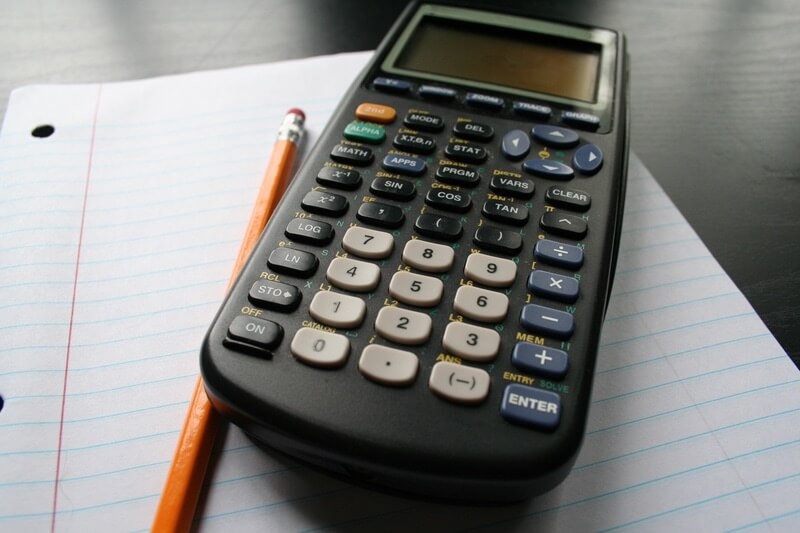
Many students want to know if you get a calculator on the MCAT, and we totally understand. Having a calculator by your side will make all of the math on the MCAT significantly more manageable, allowing you to focus on the rest of the exam.
Read on to find out if calculators are allowed on the MCAT, and why the existing rules were put in place.
Table of Contents
Are Calculators Allowed On The MCAT?
The MCAT is an interdisciplinary exam that tests your knowledge on a wide range of topics. Meant to gauge your critical thinking and reasoning skills, it’s one of the most challenging tests you’ll ever take.
In addition to the passage-based questions, some will involve mathematical problems. So does that mean you’re free to bring a calculator into the testing center with you?
Unfortunately, you do not get a calculator on the MCAT.
The Association of American Medical Colleges (or AAMC) does not allow calculators of any kind. That includes phone apps, basic standalone calculators, or complex graphing calculators. None of it is permitted.
Why Is This The Policy?
There are a couple of reasons why the AAMC doesn’t let you use a calculator on the MCAT.
The most obvious is the potential for cheating. Graphing and scientific calculators, which undergraduate students frequently use throughout their studies, are impressively complex. They’re practically standalone computers.
While they can make mathematical endeavors much easier to complete, these devices are also easy to modify. They’re programmable and can easily save data or equations. Skilled hackers can even run entire programs and access files on those tiny screens.
That alone is enough to make calculators out of the question. The MCAT plays a considerable part in determining who becomes future healthcare leaders. The AAMC takes it very seriously and takes no risk in potentially harming the exam’s credibility.
Another reason why calculators aren’t permitted is the nature of the exam itself. The MCAT is not a mathematical test. While it might include some problems you need to solve, the point of this exam has nothing to do with your ability to solve complex equations. Doctors have access to calculators in the real world.
The goal of the MCAT is to test your reasoning skills. Medical schools want to know that you can comprehend challenging situations and approach them without succumbing to pressure. Your ability to input numbers and equations into a calculator has nothing to do with your critical thinking skills. The calculator does all of the hard work!
Despite how it might feel in the moment, those questions don’t exist solely to gauge your mathematical capabilities. It’s still important to get the correct answer, but the focus isn’t purely on the math you used to get there.
Should This Concern You?
It’s not uncommon to see first-time test-takers panic when they realize that they don’t get a calculator on the MCAT. While it’s easy to get stressed out about that fact, it shouldn’t be much of a concern.
You see, the MCAT is strategically designed so that all questions are possible to answer without a calculator. That doesn’t mean the problems will be super easy, but it does mean that there’s usually a simple and straightforward way to come up with the solution.
The trick is to figure out how to get there. Ultimately, that’s what the MCAT is trying to test you on most.
To be successful on the MCAT math questions, you need to prepare a little differently. Rather than focusing on memorizing a ton of complex equations, you have to teach yourself how to find solutions independently. There’s a good chance that you have spent the last decade or so relying heavily on your calculator to do complex math. That’s no longer an option, so you must shift your MCAT study strategy to reflect that.
With effective study methods, you should be able to solve all questions calculator-free and get a good score without too much trouble.
What Sort Of Math Is On The MCAT?
Generally, the math questions appear during the “Chemical and Physical Foundations of Biological Systems” section of the MCAT.
As you can imagine, most of the problems will revolve around scientific concepts pertinent to medicine. You may also run into questions that require math to solve physics and chemistry problems.
You don’t have to worry about complex calculus. The questions rely on fundamental mathematical concepts like algebra, trigonometry, and arithmetic. Knowledge of basic statistics and statistical reasoning comes into play as well.
There’s a common misconception that the math questions are easy. Some assume that because no calculator is allowed that more difficult challenges won’t get in the way. That’s not necessarily the case.
This is the MCAT! There’s no denying that the MCAT is designed to be hard. However, many will have straightforward solutions or ways to simplify the equations and come up with a suitable answer.
How To Perform Well On The MCAT Without A Calculator
Giving up your reliance on your trusty calculator is not easy. But when you take the MCAT, you have no other choice!
The good news is that there are many ways to prepare yourself for the challenge ahead. Here are some ways that you can perform well on the MCAT without your calculator in tow.
1. Brush Up On Mental Math
When was the last time you had to do basic arithmetic in your head? If you’re like most, it’s been a while! We rely so much on our calculators that many people forget how to do the basics.
Spend some time familiarizing yourself with all of the things you forgot. Don’t be ashamed to go over fundamental math problems! It’s better to go through that struggle now than during the MCAT.
Try incorporating mental math into your everyday life. Whether it’s while you cook dinner and portion our ingredients or manage money as you shop, doing all that math quickly in your mind will make all the difference.
Also, familiarize yourself with going through the equations you need to know on paper.
While you don’t have access to a calculator during the MCAT, the testing centers typically provide scratch paper. It might come in the form of a personal dry erase board or a simple blank piece of copy paper. Either way, take full advantage of it.
Knowing how to do the math on paper, in your head, or by hand will help you conquer those tough questions. Just don’t wait until the day of the test to learn how.
2. Learn To Simplify
Simplification goes a long way with complicated math equations (especially when you don’t get a calculator). One of the best things you can do is get comfortable making estimates as you perform the math.
There are many ways to do this. If you’re looking at a lengthy equation, break it up into smaller, manageable pieces. Figure out the smaller variables, follow the order of operations, and simplify as you go.
For those questions with tough fractions, consider turning them into decimals. You can do it in seconds with your scrap paper and turn an otherwise mind-numbing equation into something that’s a little more accessible.
You can even round things up or down. Ditch the decimals and focus on whole-number equations. Doing so lets you find the answer with your hand or head.
Even if the number isn’t exact, you can look at the available answers and choose the one that’s the closest match.
Simplification is key to conquering the MCAT math questions.
3. Get Comfortable With Reasonable Accuracy
This tip goes hand in hand with the concept of simplification. It would help if you got comfortable not being exact for every answer.
That can be a hard habit to break. Many students go through their academic journey being precise with everything they do. However, that does nothing but waste time and energy during the MCAT.
Most of the choices on each question will be vastly different. As a result, you can get away with only being reasonably accurate. There shouldn’t be too much of a problem seeing which one is right.
Remember, the MCAT is about testing your critical thinking and reasoning skills. The AAMC cares more about your understanding and how you got the answer than your basic math skills.
4. Manage Your Stress & Overall Pace
Last but not least, take some time practicing pacing.
The MCAT is a very long test, so it’s easy to get burnt out. This is especially true when faced with what looks like a tricky math question.
Pacing yourself and staying calm is paramount. For most sections, you have less than two minutes per question.
Time yourself as you go through practice tests. Get familiar with working under pressure and learn how to find solutions relatively quickly. All of the previous tips of simplification and doing math in your head will help you get there.
But as the saying goes, “Practice makes perfect.” Get a good feel of the math questions and how long you take to complete them.
Conclusion
Even though you don’t get a calculator on the MCAT, the math portion of the exam shouldn’t scare you.
You’ll be fine as long as you follow the basic principles above and put in enough study time!




